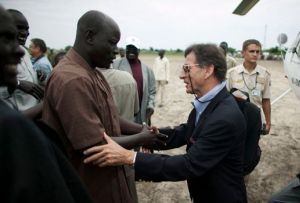Sudan says US denied its diplomat statement on “changing state structure”
February 15, 2011 (KHARTOUM) – The U.S. embassy in Khartoum has declined calls by Sudanese government for clarifications on statements in which its top diplomat in South Sudan allegedly said that the U.S. strategy in Sudan aims to “change the structure of the state,” the country’s foreign ministry said Tuesday.

According to a report carried by Sudan Media Center (SMC), a website closely linked to Sudan’s National Intelligence and Security Services (NISS), the U.S. diplomat met with SPLM secretary general Pagan Amum, head of SPLM Northern Sector Yasir Arman and the SPLM’s leader in the Nuba Mountains Abdel Aziz Al-Hilu.
The website reported that Walkley had told SPLM officials that the U.S. strategy towards Sudan aims at “changing the structure of the Sudanese state,” and that Washington would not abandon the issues of Abyei, Blue Nile and Nuba Mountains (South Kordofan) in light of their importance in the context of the 2005 Comprehensive Peace Agreement (CPA).
The official spokesman of Sudan’s Ministry of Foreign Affairs, Khaled Moussa, on Tuesday said that the ministry had received a response from the U.S. embassy which reaffirmed commitment to implementing the understandings made between U.S. and Sudanese officials to maintain security and stability between North and South Sudan.
Moussa warned that the ministry and other state apparatus would nevertheless continue to monitor any activities that negate the understandings made in this regard and would take necessary measures whenever the occasion demands.
The U.S. Administration this month started a process to remove Sudan from its list of states sponsoring terrorism as a reward for implementing the CPA, but some Sudanese officials cast doubts on the seriousness of the U.S. to follow through on its promises.
The CPA is the 2005 peace agreement that ended more than two decades of North-South civil war and gave the South the chance to vote on self-determination. The region voted overwhelmingly for secession from the North in a referendum last month and is preparing to be officially pronounced independent when the CPA expires in July this year.
Abyei, Blue Nile and South Kordofan, referred to as ‘the three areas’ in the CPA, were granted special status in the peace deal. Oil-producing Abyei is supposed to hold a referendum to decide whether it will remain in the North or be transfered to South Sudan. But it has been delayed over disputes between Khartoum and Juba regarding who is eligible to vote.
The right of self-determination or the option to join the South was not granted to Blue Nile and South Kordofan. Instead the two states, which are in Northern Sudan but border the South, were accorded Popular Consultations to review the CPA and address any grievances.
Groups from both states joined the SPLM in fighting against successive Northern governments in Sudan’s second North-South (1983-2005) but will remain governed by Khartoum after the South secedes in July.
In Blue Nile state the Popular Consultations have already begun but in South Kordofan, where last years elections did not take place, the process is due to start later this year after the elections, scheduled for April, are held.
(ST)
